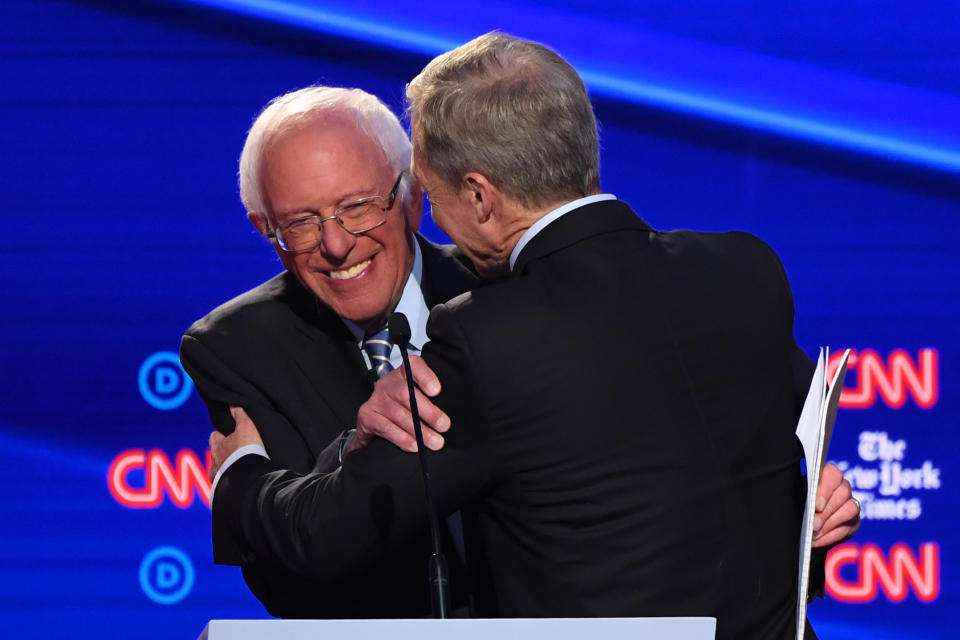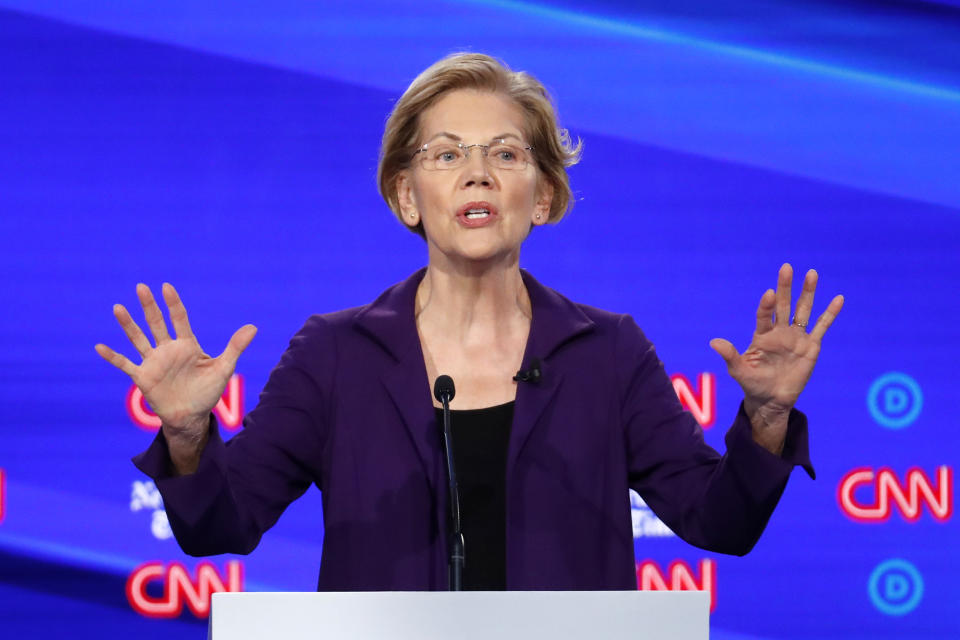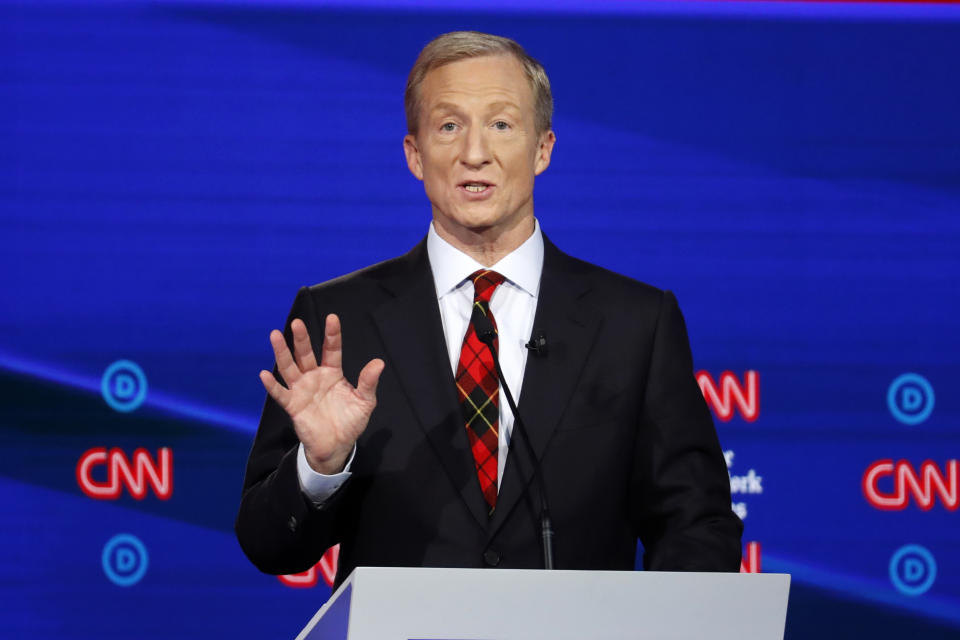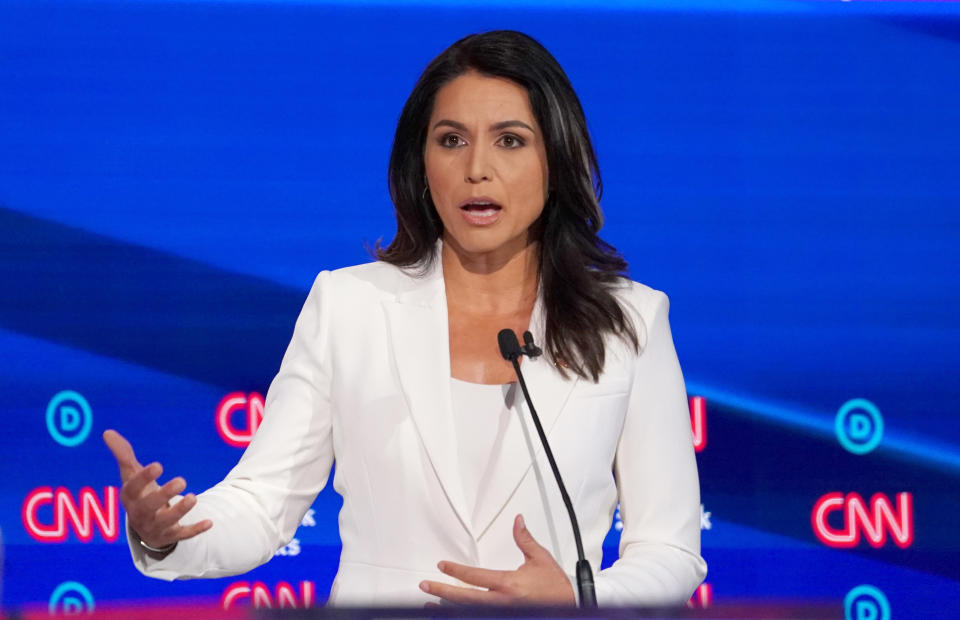5 key takeaways from the Democratic debate in Ohio
A lot had happened between September’s Democratic debate and Tuesday night’s fourth gathering of presidential hopefuls: The House announced a formal impeachment inquiry into President Trump; the White House responded by increasing attacks on former Vice President Joe Biden; Sen. Bernie Sanders suffered and recovered from a heart attack; and Sen. Elizabeth Warren continued her climb in polling, usurping Biden as the leader in Iowa.
How much difference a single three-hour debate will matter in a news cycle driven by impeachment will be answered in the coming days, but here are five takeaways from the CNN-New York Times debate at Otterbein University in Westerville, Ohio.

1) Bernie’s big night
One of the biggest questions leading up to Tuesday was the health of Sen. Bernie Sanders, who suffered a heart attack just two weeks ago.
Sanders appeared sharp from the get-go, declaring President Trump the “most corrupt president in the history of this country” and defending his Medicare for All plan while railing against the “dysfunctional” health care system he wants to overhaul.
When asked about his health by CNN co-moderator Erin Burnett, he clearly did not want the focus on him.
“I’m healthy, I’m feeling great,” he said, before pivoting briefly to a question about opioids that was asked just before.
Eventually, the 78-year-old, who is the oldest candidate running for the Democratic nomination, took the opportunity to thank his rivals for their outpouring of support.
“Let me take this moment if I might to thank so many people from all over this country, including many of my colleagues up here, for their love, for their prayers, for their well wishes,” Sanders said. “And I just want to thank you from the bottom of my heart. And I’m so happy to be back here with you this evening.”
Sanders said he would be holding a big rally in New York City Saturday that would feature a surprise guest. A Washington Post report, later confirmed by other media outlets, said it would be freshman Rep. Alexandria Ocasio-Cortez, who would be giving him her much-sought-after endorsement. Just after the debate ended, Rep. Ilhan Omar of Minnesota announced her endorsement of Sanders, citing their work together on eliminating student debt and providing free meals in schools year-round to every student who wants one. There were additional reports that Rep. Rashida Tlaib of Michigan would also be endorsing Sanders.

2) Warren the frontrunner?
If you go by national polling, Biden is still slightly ahead of Warren, but her rivals, in focusing their attacks on her, seemed to be signaling that the Massachusetts senator is the one to beat. Warren was hit early and often, although not all the blows landed.
Early on she was pushed by Mayor Pete Buttigieg and Sen. Amy Klobuchar on her support for Medicare for All and for her refusal to say middle-class taxes would go up. Rep. Tulsi Gabbard attempted to engage Warren on foreign policy, but was cut off by a commercial break. Sen. Kamala Harris went on a questionable tangent trying to get Warren to agree that President Trump should be banned on Twitter. Biden returned to one of his frequent themes, that he was the only person on the stage who had gotten big things done — but Warren claimed credit for the creation of the Consumer Financial Protection Bureau before she was a senator. Biden, who was vice president at the time, said he had helped round up the votes for it. Warren paused before thanking Obama for his support.

3) Steyer makes his debut, not much of a mark
This was the first debate for billionaire businessman Tom Steyer, who announced he was entering the race in July. Steyer, who funded an ad campaign calling for President Trump’s impeachment, kept trying to leverage his speaking time to introduce his candidacy. There wasn’t much time, however, as Steyer spoke for just seven minutes and 12 seconds, the least amount of time of any candidate. For comparison’s sake, Klobuchar — who is polling around the same sub-2 percent mark as Steyer — spoke for over 13 minutes. Steyer did have a notable exchange when he agreed with Sanders that wealth inequality was a major issue, calling the current economic system “absolutely wrong. It’s absolutely undemocratic and unfair. I was one of the first people on this stage to propose a wealth tax.”
Steyer has pledged to spend $100 million of his own money on his campaign and he’ll have a second opportunity to speak to voters: He’s one of seven Democrats who have already qualified for next month’s debate.

4) Abortion is raised — finally
During a discussion on health care, Sen. Kamala Harris lamented how little focus there has been on women's reproductive rights during the debates.
“This is the sixth debate we have had in this presidential cycle and not nearly one word, with all of these discussions about health care, on women’s access to reproductive health care, which is under full-on attack in America today,” Harris said. “Women are the majority of the population in this country. People need to keep their hands off of women’s bodies and let women make the decisions about their own lives.”
The issue of abortion came later during the debate, again eliciting a passionate response from Harris.
“Women have been given the responsibility to perpetuate the human species,” she said. “Our bodies were created to do that. And it does not give any other person the right to tell a woman what to do with that body. It is her body. It is her right. It is her decision.”
It also gave Rep. Tulsi Gabbard, who now considers herself pro-abortion-rights but supports abortion restrictions in the third trimester, the opportunity to highlight the difference.
“I agree with Hillary Clinton on one thing,” Gabbard explained. “I disagree with her on many others. But when she said abortion should be safe, legal and rare, I think she’s correct.”
The assertion drew supportive tweets from Leana Wen, the former president of Planned Parenthood.
I don’t agree with @TulsiGabbard on a lot, but do appreciate that she brought up the third rail for Democrats: that abortion should be “safe, legal, and rare.” We should reduce the need for abortions by investing in prevention.
— Leana Wen, M.D. (@DrLeanaWen) October 16, 2019
Was also courageous @TulsiGabbard to bring up nuances. Most Americans hold complex truths: they can both personally oppose abortion & support others’ right to choose; they can both feel uncomfortable about abortion & not want women to die from back-alley procedures #DemDebates
— Leana Wen, M.D. (@DrLeanaWen) October 16, 2019
Then, during a discussion about the Supreme Court and its landmark Roe v. Wade decision, Sen. Elizabeth Warren sought to reframe the issue.
“I lived in an America where abortion was illegal. And rich women still got abortions,” Warren said. “What we’re talking about now is that the people who are denied access to abortion are the poor, are the young.”
5) No climate change
The biggest issue that wasn’t addressed in the marathon forum was climate change. The moderators retrod familiar ground on health care, redundantly allowed each of the 12 candidates to agree on the impeachment inquiry and closed by asking each of them to name an unlikely friendship, inspired by the pairing of former President George W. Bush and talk show host Ellen DeGeneres at an NFL game. (Several of them singled out the late Sen. John McCain.) They did not address the global ecological disaster that United Nations scientists said last month could be “hitting harder and sooner” than anticipated.
“Not one single question about the climate crisis,” wrote Washington Gov. Jay Inslee, who dropped out of the presidential race earlier this year after pushing his single-issue campaign. “Not one single question about the climate crisis. Not one single question about the climate crisis. This is the existential crisis of our time. Not one single question, and that’s completely inexcusable.”
“Three hours and no questions tonight about climate, housing, or immigration,” wrote the account of former Housing Secretary Julián Castro while he was still on the stage. “Climate change is an existential threat. America has a housing crisis. Children are still in cages at our border. But you know, Ellen.”
_____
Download the Yahoo News app to customize your experience.
Read more from Yahoo News:
No debate about it: Dem candidates agree on impeachment inquiry
‘I’m feeling great’: Bernie Sanders returns to debate stage after heart attack
Biden defends his son — and himself — over Trump's Ukraine claims
Yang and O'Rourke propose decriminalizing opioids, including heroin
Tulsi Gabbard clashes with Democratic rivals over 'Syrian regime change war'




